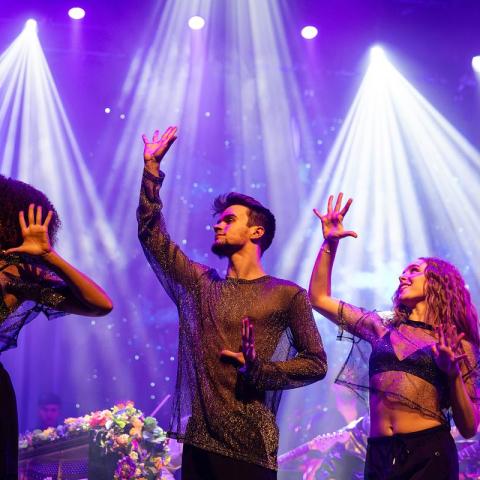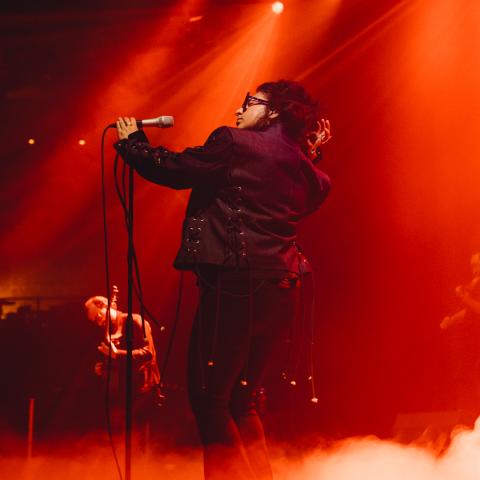Celebrating Burton’s 50 Years at Berklee

Hail from the Chief (from the left): Makoto Ozone, Tiger Okoshi, Antonio Sanchez, Gary Burton, Jim Odgren, and Donny McCaslin after performing in the April 8 concert honoring Burton.
Phil Farnsworth
A special concert on April 8 celebrated the 50th anniversary of Gary Burton’s arrival at Berklee. Coming to Boston from rural Indiana as a student in 1960, Burton later returned as a Berklee faculty member in 1971. By 1996 he had become the dean of curriculum and then, until his retirement in 2004, served as the college’s executive vice president.
In his welcome remarks to the audience, President Roger H. Brown recounted Burton’s achievements as an innovator in vibraphone technique, his six Grammy Award wins, his brilliant educational legacy at the college, and more. “Gary did all these incredible things for music and for Berklee,” Brown recalled. “It’s no exaggeration to say that without Gary Burton, Berklee would not have become the amazing place it is today.”
As a retrospective of four decades of the vibraphonist’s performing career, the concert presented four different groups of stellar musicians who have worked with Burton at various points during his career. Burton led each group in three representative works from their epochs.
First up were members of Burton’s New Quartet (formed in 1971), with Mick Goodrick (guitar), Abraham Laboriel (bass), and Harry Blazer (drums). They revisited pieces by Chick Corea, Carla Bley, and Michael Gibbs. From the downbeat, Burton was at the top of his form on the melodies and solos on all three selections. Goodrick’s introspective lines on Corea’s “Open Your Eyes You Can Fly” contrasted sharply with Laboriel’s energetic solo that culminated with string snaps, rhythmic slapping, and tremoloed lines as the bassist leaped around the stage. All shared the spotlight on Gibbs’s twisted blues number “Blue Comedy.”
The first of two all-star lineups joined Burton onstage for the next segment. John Scofield (guitar), Joe Lovano (tenor sax), Steve Swallow (bass), and Antonio Sanchez (drums) deftly navigated Swallow’s Latin-grooved “Como en Vietnam,” Scofield’s odd-time “Why’d You Do It?” and Carla Bley’s eccentric “Syndrome.” Burton noted that Lovano was a student in the vibist’s first class at Berklee. Scofield’s and Lovano’s driving, sinewy solos confirmed that Burton’s onetime mentees became his peers some time ago.
Swallow and Sanchez continued as the rhythm section for the second all-star lineup that included pianist Makoto Ozone, trumpeter Tiger Okoshi, and saxophonists Jimmy Odgren and Donny McCaslin. Burton announced that playing Keith Jarrett’s lovely ballad “Coral” was Okoshi’s suggestion, and the trumpeter fittingly offered a lyrical solo before Ozone segued into his blues tune “Test of Time.” All performers soloed on the medium-tempo blues. Burton’s improv dug deeply into the groove, while McCaslin’s solo featured perfectly chosen “out” notes that drew enthusiastic hoots from the audience. Ozone’s rhythmically adventurous extrapolations drew applause when he and Sanchez nailed an emphatic downbeat after a long, reeling passage that had ignored several bar lines. Burton announced that the third tune, “Eiderdown,” was the first Swallow ever penned. Appropriately, the bassist embarked on one of his trademark melodic solos in his chorus.
The final group was Burton’s young Next Generation band, which featured Julian Lage (guitar), Vadim Neselovskyi (piano), Luques Curtis (bass), and James Williams (drums). Following an extended waltzing solo piano intro by Neselovskyi, Lage’s tune “Early” explored a tango groove featuring the guitar prodigy in a strikingly chromatic solo. Pat Metheny’s “Elucidation” was comfortable turf for Burton, who pulled out all the stops in his solo. They closed with “Bags’ Groove,” Burton’s tribute to fellow vibist Milt Jackson. Notably, Curtis rendered a loping solo over the lazy, medium-swing groove for his chorus, and Neselovskyi improvised intricate unison lines with his left hand on the piano and his right on a melodica.
Surprise guest Chick Corea joined Burton for the encore and, before a note sounded, brought the audience to its feet. Corea’s angular intro led the duo into his Latin tune “La Fiesta.” As they soared over the changes and alternately provided sparse but hard-grooving comping under each other’s solos, Burton and Corea proceeded to blow the roof off the Berklee Performance Center. The show ended with all musicians returning to the stage, offering back slaps and hugs to one another as the crowd applauded thunderously. The evening provided copious evidence of Burton’s leavening influence on three generations of jazz musicians.




